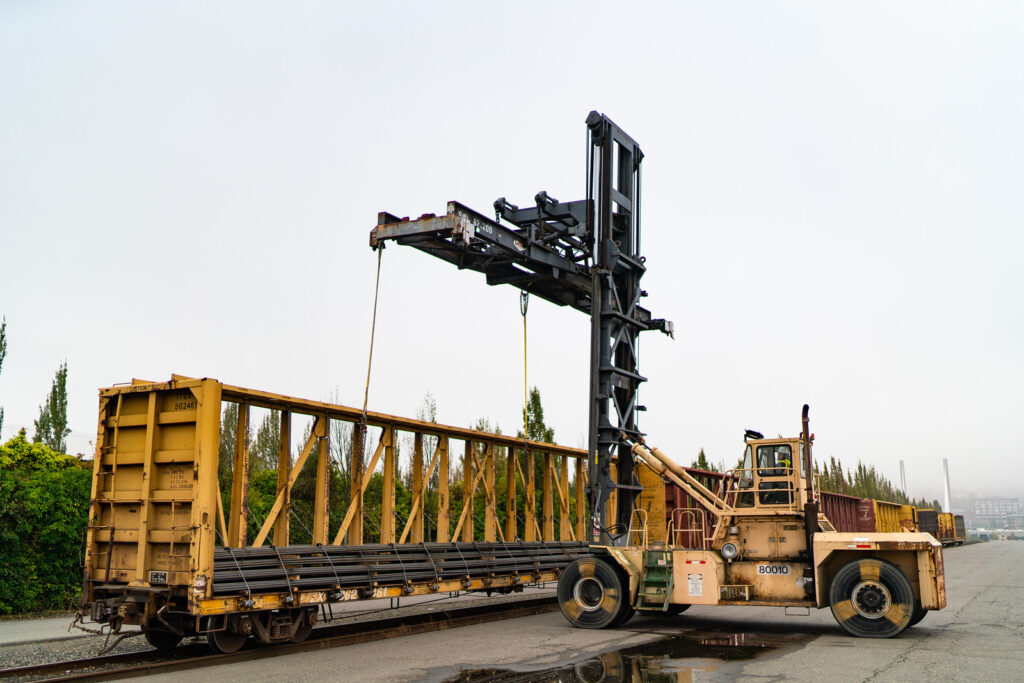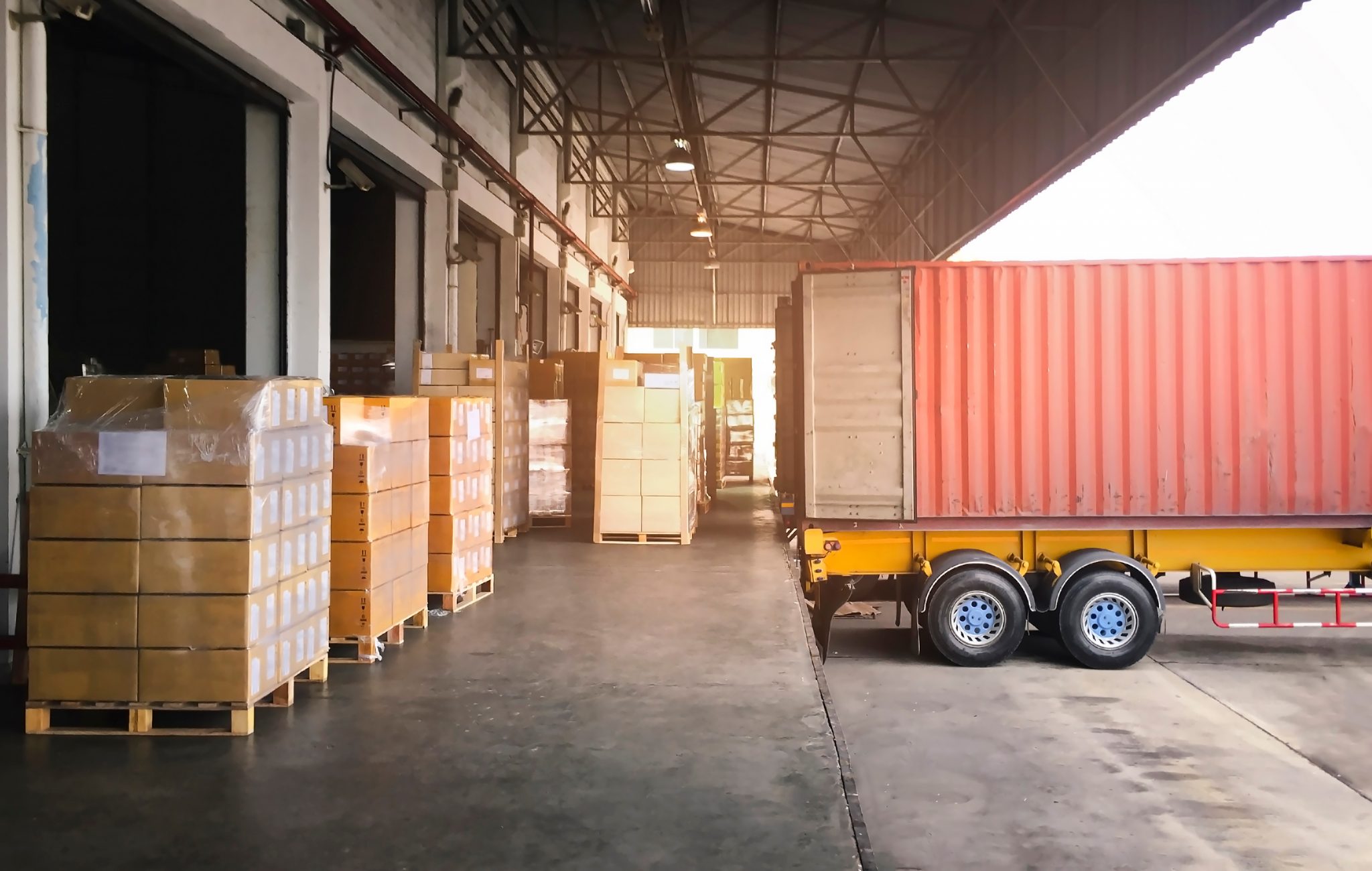In our Supply Chain 101 blog on transloading, we discussed the various solutions that transloading offers through its proximity to the ports, flexibility and time efficiency. Navigating the intricate world of logistics, especially when dealing with a variety of commodities, requires a deep understanding of the unique needs associated with each type of cargo. Whether it’s the delicate handling of refrigerated goods or the robust requirements for transporting heavy metal billets, each commodity demands specific attention to ensure safe and efficient delivery. In this blog post, we’ll explore the nuances involved in handling specialty cargo, such as dry bulk, reefer cargo, billets, project cargo, and auto parts, highlighting the unique methods and safety measures required for each. By selecting a transloading provider that understands these distinctions, you can optimize your supply chain operations, reduce risks, and ensure the integrity of your goods from origin to destination.

Dry Bulk
Dry bulk materials such as grains, minerals, and powders are typically moved using conveyor belts, pneumatic systems, or bucket elevators. They are usually not packaged but transported in bulk carriers, hopper cars, or silos. Regular inspection for contamination and integrity of the containment systems is crucial. Bulk materials are stored in silos, tanks, or warehouses designed for dry bulk materials. It’s important to ensure that bulk materials are contained to prevent spillage and contamination. Another key factor is the implementation of dust control measures to maintain air quality and safety. It is also essential to protect materials from moisture to prevent spoilage or degradation.
These commodities are often transported to us via rail. Rail transportation of dry bulk commodities involves using specialized hopper cars that are designed to handle large volumes of bulk materials efficiently. The demands of rail transport include the need for careful planning of loading and unloading operations to prevent contamination and ensure the integrity of the cargo. Railcars must also be regularly inspected for cleanliness and structural integrity. Additionally, the rail infrastructure must support the heavy loads associated with bulk materials, necessitating robust track maintenance, and scheduling to prevent delays and ensure timely delivery.
Dry bulk transloading methods are used in the agricultural sector, including the transport of grains, seeds, and animal feed. It is also related to the mining industry as dry bulk is a method to transport minerals like coal, ore, and cement. Dry bulk methods are also used in the chemical industry to transport raw materials for chemical production, such as fertilizers and plastic resins. Rail transport plays a significant role in these sectors, offering an efficient and cost-effective means of moving large quantities of materials over long distances.
Reefer (Refrigerated Cargo)
Reefer cargo requires specialized equipment to handle and maintain a temperature-controlled environment. Goods are often packed in insulated containers or refrigerated trailers, known as reefers. Reefer cargo requires constant monitoring of the temperature and condition of the cargo whether in transit, storage or during transloading. The cargo is stored in refrigerated warehouses or cold storage facilities which focus on maintaining specific temperature ranges to preserve perishable goods. Timely handling is important to ensure that the transported goods do not spoil or impact the product’s shelf life. Reliable power sources are essential to keep refrigeration units running during transit and storage in addition to employees checking the temperature of the units.
Reefer commodities are also frequently transported via rail, using specially designed refrigerated railcars. These railcars maintain the required temperature throughout the journey, ensuring that perishable goods remain fresh upon arrival. Rail transport of reefer cargo requires a consistent and reliable power supply for the refrigeration units throughout the transit. This may involve the use of auxiliary power units or connections to the railcar’s refrigeration system. Furthermore, rail operators must monitor and manage temperature and humidity levels, ensuring that any deviations from the desired temperature are quickly addressed to prevent the cargo from spoiling.
Reefer cargo is typically food and beverage, including perishable goods like fruits, vegetables, meat, dairy, and beverages. Reefer methods are also used to transport temperature-sensitive medicines and vaccines, as well as fresh flowers and plants. Rail transport is particularly beneficial for these commodities as it offers a stable environment with less handling compared to road transport, which minimizes the risk of temperature fluctuations and physical damage to the cargo.
Billets (Metal)
The handling of billets requires heavy-duty forklifts, or other specialized equipment to move the heavy and long billets. Usually, billets are bundled and strapped together to prevent movement during transit. Inspection includes checking for surface defects and rust to ensure the integrity of the bundles. They are stored in well-ventilated covered areas to prevent rust and degradation. Some key details to consider when handling billets include being careful to prevent scratches, dents, and rust. As well as maintaining accurate tracking due to high value and specific dimensions.
Billets are used in manufacturing as raw materials for forging, rolling, and machining into finished products. They are also used in the construction sector in structural components like beams, bars, and rebar. Billets are also used in both the auto and aerospace industries to produce high-strength components for vehicles and aircraft.
Project Cargo
Project cargo often involves customized solutions including cranes, specialized trucks, and sometimes even ships designed for heavy or oversized cargo. Depending on the nature of the cargo, packaging can include crates, pallets, or other packaging solutions. A detailed inspection is required to ensure the cargo is securely packed and there is no damage. It is vital to consider that project cargo often involves oversized or heavy-lift items, requiring detailed planning and coordination. Additionally, each project may need unique handling and transport solutions to remain in compliance with regulations related to oversized and heavy cargo.
Project cargo is used in infrastructure projects such as transporting large and heavy components like turbines, generators, and bridges. It is also used in the energy sector for shipping parts for wind farms, oil and gas rigs, and power plants. Another commonly handled project cargo includes oversized machinery and plant components.
Auto Parts
Auto parts vary in size and weight, from small components to large engines. Proper handling equipment like forklifts and cranes may be required. Auto parts are often shipped in crates, pallets, or specially designed containers to protect them from damage. They require careful inspection is necessary to check for any damage during transit. Auto parts must be stored to prevent damage and facilitate easy retrieval. Some parts are delicate and require careful handling to avoid breakage. Auto parts might need to be tracked individually or in sets, requiring accurate inventory management. Some auto parts, especially those with rubber or plastic components, may require temperature-controlled environments.
Auto parts are essential for assembling cars, trucks, and other vehicles in manufacturing plants. These parts are used for vehicle repair and maintenance in auto repair shops and by individual consumers. Original Equipment Manufacturer parts are used by automakers for vehicle production and by dealerships for repairs.
Handling commodities with precision and care is not just a necessity but also a competitive advantage in today’s fast-paced logistics industry. At GSC, we specialize in providing tailored logistics solutions that address the unique challenges of each commodity type. Contact us today to learn how we can help streamline your supply chain, safeguard your cargo, and deliver excellence at every step of the journey. Let’s partner together to take your logistics operations to the next level.



